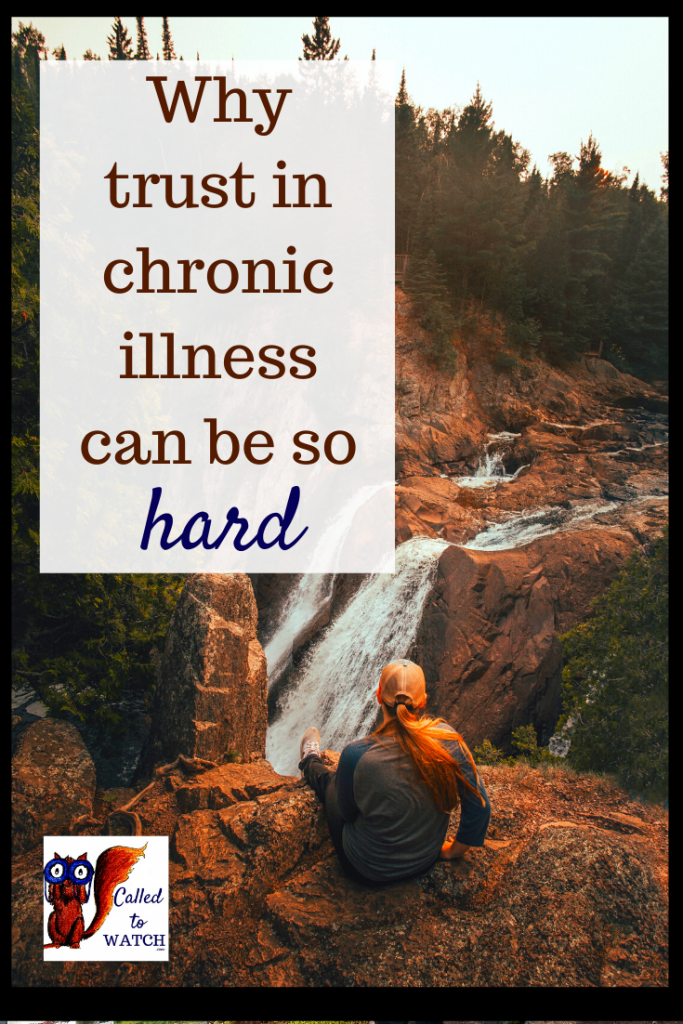‘I trust you.’ ‘I believe you.’ ‘Okay.’ Expressions of trust can seem simple, and can be a great gift to those who receive them. When we trust another person, we show respect, bolster confidence, and validate experience.
We are effectively saying, ‘I hear you, I believe you know what you’re talking about, and I am going to assume that you are capable and autonomous until proven otherwise.’ We are demonstrating a ‘firm belief in someone’s reliability, ability and truthfulness’ (thank you, Oxford Dictionary).
So far that sounds quite straightforward.
Yet in the context of chronic illness, trust can often be accepting your chronically ill Loved One’s assessment of their capabilities, believing their description of the situation, and assuming they have valid ideas, dreams and motivations.
Still sound simple?
When trust and chronic illness seem incompatible
What about this scenario:
LOVED ONE: ‘I’m feeling fine.’
WATCHER: ‘You don’t look fine.’
LOVED ONE: ‘I am fine.’
WATCHER: ‘You weren’t fine yesterday, and I really don’t think going out is a good idea. Why don’t we watch TV instead?’
LOVED ONE: ‘No, I’d like to go out. I really am feeling fine.’
WATCHER: ‘You’re not feeling fine! You look terrible, and you’re just saying you’re fine because you don’t want to miss out.’
Now all of us will have to change and adapt this scenario to our particular situation. But do you see how easy it is not to trust someone? How quickly we can barge into the situation, thinking we know best, steam-roll down all objections, and end up not only assuming we know what our Loved One is thinking, but criticising their thoughts as well!
My friends, I hardly need to point out that this is not trust.
Yet it can happen in subtler ways as well. We can fail to trust when we eye-roll our way through protests, or dismiss our Loved One’s ideas before we’ve really heard them. It’s so easy not to trust… and sometimes it feels like we have a good reason not to.
Why we feel like we can’t trust in the context of chronic illness
I’ve written out a hypothetical conversation above, but let’s take a look at the thoughts and beliefs which are behind the words.
WATCHER: ‘You don’t look fine.’
I trust my eyes more than I trust your assessment of your own health.
-> Perhaps this is because in the past you have said you were ‘fine’ and you weren’t, and I’m not willing to trust that today will be any different.
WATCHER: ‘You weren’t fine yesterday, and I really don’t think going out is a good idea. Why don’t we watch TV instead?’
I trust our past experience more than your words, and know that in the past you are often not ‘fine’ for several days in a row. Why should today be different?
-> If you end up not being ‘fine’ it will cause a lot of bother and trouble for all of us. Watching TV is a much safer, lower risk option.
WATCHER: ‘You’re not feeling fine! You look terrible, and you’re just saying you’re fine because you don’t want to miss out.’
I think I know your motivations, and I think they are childish and irresponsible. My assessment of you is the correct one, I completely understand your thoughts, and the situation.
-> I don’t trust that you might actually have other motivations or that your current motivations are actually valid.

Why we choose not to trust
Trust costs us
Ouch. Perhaps we might not spell out our thoughts, beliefs and motivations so pointedly, but I wonder if often thoughts like these are lurking behind our words and decisions. As humans we naturally incline to the path of least resistance. The problem with trust is that it always costs something.
When we trust someone we are choosing to bear or absorb the fall-out if our trust turns out to be misplaced. In the scenario above, we will have to deal with the situation should it turn out our Loved One is not ‘fine’. There may be consequences for us, for them and even for others. There might be serious ramifications, or it might only be a minor inconvenience.
Trust costs them
Sometimes it can be hardest when we’re not the ones who will suffer. Our desire to protect our Loved One is often greater than our desire to grant them the gift of trust.
The problem with trust is that it always costs something.
Called to Watch
Trust always has consequences, whether we’re dealing with chronic illness or not. These consequences may be good or bad. There’s never complete certainty, but there are some questions we can ask ourselves each time we are faced with an opportunity to trust.
Questions to ask before you choose to trust
1. What’s stopping me from trusting? (my pride, habit, fear, desire for comfort, efficiency, genuine medical/practical reason)
2. What are the benefits of trusting? (demonstrating respect, validating the situation, acknowledging autonomy)
3. Am I willing to bear the cost of the gift of trust? (even if that’s watching someone else suffer)
Hope for when trusting is hard
We need to remember that the future is not set in stone. Just because something has happened a thousand times, doesn’t mean it will happen a thousand and one times! When we choose to hope, we choose to see each situation as a possibility.
We also need to remember that we can explain why we don’t feel we can trust. Trust can be a conversation – not just a silent, split-second decision. In fact, having a conversation about trust can be an act of trust in itself!
Lastly, we need to remember that ultimately we’re not really trusting our Loved One, or fate, or statistical probability. If we belong to Jesus’ family, we are actually trusting in God. We are trusting that our decision to trust or not trust our chronically ill Loved One will not surprise him. We are trusting that he will work all things for good as he promised, and he will give us the courage and strength to trust when and how we need to, for his glory.
Like before, take a moment to reflect on Isaiah 50:10 –

Have you signed up to stay in the loop, regarding my up-coming memoir Two Sisters & a Brain Tumour? If not, join up below… the release date is only 6 months away now!

//I want to err on the side of trusting, rather than not-trusting, but it can be really hard. When do you find it difficult to trust your chronically ill friend?
This post may have raised several questions. I’d love to hear from you in the comments! The topic is complex and sensitive and we’ll delve deeper into it over the course of the year 🙂 Earlier posts include:
JAN: Stepping into 2021 with trust
FEB: Giving the beautiful gift of trust
PS: Enjoyed the post above? Get the next one delivered straight to you! Sign up for email notifications
I’m also on Facebook, Pinterest, Instagram & Twitter! Meet me there for more interesting reads, resources and community.


